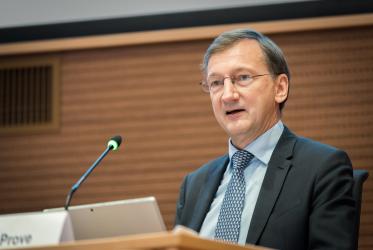Joint Communique of the Center for Inter-religious Dialogue of the Islamic Republic of Iran and the World Council of Churches, Tehran, Islamic Republic of Iran.
February 15-16 2014
The Center for Inter-religious Dialogue of the Islamic Culture and Relations Organization and the World Council of Churches held their Seventh round of dialogue on “Spirituality and Modernity” in Tehran on February 15-16 2014.
The dialogue, which was held on the invitation of the Center for Inter-religious Dialogue in Tehran, is a continuation of the dialogue that was launched between Iranian Muslim scholars and Christian scholars from the World Council of Churches in 1995.
The Muslim and Christian participants in this round of talks agreed on the following points:
- The importance of emphasising our common belief in the one God (Allah) as a foundational pillar for our common spirituality.
- The need to pay attention to spirituality as a key solution to the fundamental problems of humanity. In this respect inter-religious dialogue not only prepares the ground for an exchange of views, but also makes it possible for the followers of our religions to have a mutual understanding of each other’ religious teachings and to take a common stance regarding the concerns of contemporary human society.
- Inter-religious dialogue offers a vital path to enable the establishment of peace and security. It strives for a world free from violence and extremism, underlining the commitment of both Islam and Christianity to work for peace in our world. This peace and friendship can be achieved through respecting the diversity of cultures and religions as well as by a shared commitment to ethics and spirituality. Effective dialogue can be an important tool to counteract the words and actions of those who incite religious hatred or seek to deliberately dishonour what is sacred to others. It is vital that such dialogue can find ways to involve women and young people.
- Bearing in mind our responsibility to attract the international community to take seriously peace, friendship and cooperation, we expressed our intention to work together on a common charter for peace and justice. We welcomed the UNGA Resolution “A world against violence and violent extremism” and emphasised the role of religious scholars in preventing violence and extremism.
- There is a growth in the disparity of wealth and power in our world, which can offer particular challenges to the ethical values and the commitment to peace which lie at the heart of both our religions.
- Islam and Christianity have different understandings of spirituality and modernity. Our dialogue was a time of real exchange about these differences, both between and within our delegations. However we would all want to acknowledge the role of spirituality in helping to develop an inter-religious connectedness which engages women and young people. We noted that one effect of modernity is a focus on subjectivity, which despite fostering human welfare in some respects can also be detrimental to human tranquillity. It is important to use the tools and insights offered by our respective religious traditions to establish a spirituality which offers humankind both welfare and tranquillity.
- Both sides emphasized the importance of strategic interaction with public media to promote the achievements of inter-religious dialogue in our societies. We called on the media to highlight successful examples of solidarity and cooperation across religious divides.
- Modern social networks and media play an important role in promotion of the culture of dialogue. The proper utilization of such media can promote the sharing of our religious and spiritual values among young people.
- Given the approximately twenty years since this dialogue was established we feel it is time to undertake a review of the process, discussions and results of our meetings, and will find ways to ensure this review takes place over the coming year.
The World Council of Churches expressed their particular gratitude to the Center for Inter-religious Dialogue for their generous hosting of the meeting, and in turn the Center offered their appreciation for the efforts made by the team from the World Council to come to Iran for this meeting. We jointly call for serious efforts to implement the suggestions made in this communique, and will review the results during our next round of talks. We plan that this next round of talks, which will be hosted by the World Council of Churches, should take place in 2015 or 2016 in Switzerland. Between now and then we will actively seek opportunities for contact and exchange between representatives of our two organisations.
………………………………………………………………………………………….
WCC participants in the dialogue meeting 15-16 February
Bishop Leo Paul
Rev. Dr Martin Puehn
Rev. Dr Jean-Claude Basset
Dr Elias Halabi
Archbishop Sebouh Sarkissian
Rev Sargez Benjamin
Dr Clare Amos
Ms Marietta Ruhland (administrator)
Also invited but unable to attend
Dr Heidi Hadsell
Rev. Bonnie Evans-Hills


